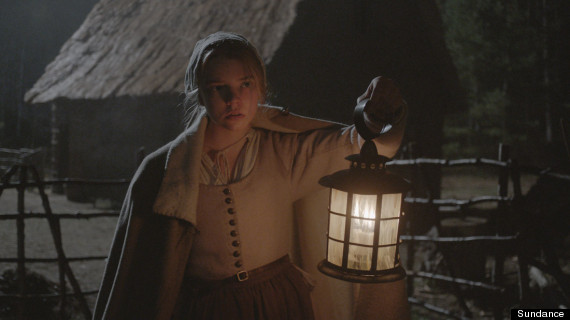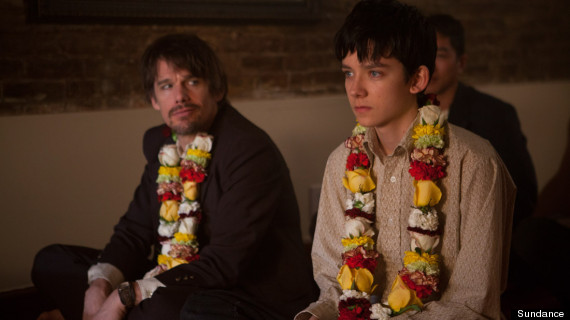George Takei Hosts My Husband's Not Straight
Takei pokes fun at TLC’s controversial Mormon reality special, My Husband’s Not Gay.
Scott Ragan
www.advocate.com/comedy/2015/01/24/george-takei-hosts-my-husbands-not-straight
George Takei Hosts My Husband's Not Straight
Takei pokes fun at TLC’s controversial Mormon reality special, My Husband’s Not Gay.
Scott Ragan
www.advocate.com/comedy/2015/01/24/george-takei-hosts-my-husbands-not-straight
Conservatives At Iowa Freedom Summit Would Rather Not Talk About Gay Marriage
DES MOINES, Iowa — Many topics animated GOP officials, activists and operatives that gathered at Saturday’s Iowa Freedom Summit, which marked the unofficial start of the 2016 presidential primary.
But an issue that once faced vehement opposition within the party — gay marriage — remained conspicuously absent from the lips of many speakers who took the stage, demonstrating how dramatically politics around the issue has shifted in just a few years.
Sen. Chuck Grassley (R-Iowa) denounced the president’s executive actions on immigration and the Affordable Care Act as unconstitutional overreach. Former House Speaker Newt Gingrich excoriated the State Department for failing to curb global terror. And Iowa’s newest Republican senator, Joni Ernst, urged Washington to balance the budget, cut spending and lower taxes, all proposals that resonated with the audience. Yet most speakers steered away from social issues near and dear to many Iowa evangelicals.
The silence was even more acute among several potential Republican presidential contenders, who came to Iowa in hopes of winning over future caucus voters. Wisconsin Gov. Scott Walker, who once campaigned for a gay marriage ban, stuck to telling his personal story in a rousing speech that was warmly received at the summit. Texas Sen. Ted Cruz railed against “EPA locusts” and called for the abolishment of the IRS. Former Texas Gov. Rick Perry urged the administration to secure the border. Former Hewlett Packard CEO Carly Fiorina blasted Hillary Clinton and her record on Libya.
The first and only mention of gay marriage came near the end of the event, when Rep. Steve King (R-Iowa), the host of the summit, introduced New Jersey Gov. Chris Christie by noting that he vetoed a bill legalizing gay marriage.
The U.S. Supreme Court will hear arguments on whether same-sex couples have a constitutional right to marry in April. A decision is expected in June, by which time the GOP presidential primary is expected to be in full swing as many candidates come off the sidelines. If the court does ultimately rule against gay marriage bans, Republican officials said, presidential contenders may gain additional support from conservatives going into the 2016 election.
“It might have an effect of pouring more energy into our base,” Iowa GOP party chair Jeff Kaufmann told The Huffington Post. Kaufmann predicted that, in the long term, Republicans would seek judicial reform “in terms of amending the Constitution.”
One influential voice among social conservatives, former Arkansas Gov. Mike Huckabee, had a different view. He recently said that states can have the final say on gay marriage regardless of what the Supreme Court says, an argument hewing awfully close to the theory of nullification. He echoed those remarks again on Saturday.
“Nobody argues that [Abraham] Lincoln should have abided by Dred Scott,” he said, in reference to the infamous 1857 Supreme Court decision that denied African-American slaves the right to sue for their freedom.
Newly elected Rep. Rod Blum (R-Iowa), who addressed the gathering earlier in the day, agreed that the matter was best left up to the states.
“Every state should have that vote and put it to their legislatures. I’m a will-of-the-people guy. I’m all for it, each state putting it to a vote of the people,” he told the HuffPost.
Others, however, sounded more resigned.
Retired neurosurgeon and potential 2016 contender Ben Carson, who recently warned that the marriage equality movement would make it “open season on Christians,” said that he didn’t believe the fight was over. But he declined to endorse the notion that states could defy the courts out of what Carson called “civil disobedience.”
“We are a country that abides by the law,” he told reporters on Saturday.
Former Pennsylvania Sen. Rick Santorum, a hard-line opponent of gay marriage who is also considering a run for president, may best reflect where the party currently stands on the matter. Addressing the press following a speech that largely focused on blue-collar workers, Santorum complained he was being unfairly pestered about an issue he previously warned would be “suicidal” for the party to embrace.
“I’m wondering if every other candidate gets this question as much as I do,” he said.
Gay Italian man gets driving license back after 15-year legal battle
Italy’s highest court found the Ministry of Defence, and Ministry of Infrastructure and Transport guilty of discriminating against him and violating his privacy
sylviat
Rachael and Hollie would you rather LGBT edition
Thought we would give this a try 🙂 thanks to all already subscribed and for all the new videos please subscribe thank you xx.
www.youtube.com/watch?v=vPaTPH3fBEM&feature=youtube_gdata
Conservative US pundit jokes about poison in wedding cakes for same-sex couples
‘What I have a problem with is when people try to force people to act against their beliefs because they say “they’re discriminating against me”‘
Jamesw
Sundance So Far: Adam Scott & Jason Schwartzman's Fake Penises, Ethan Hawke's Latest Dad & 'The Witch'
Last time on Sundance So Far, we discussed “The Bronze” and other movies that opened the festival. Temperatures dropped to 18 degrees at sundown in Park City, Utah, on Day 2 of Sundance. Parkas were out and crowds were thick at some of the most anticipated films of the opening weekend. The press screening for “Z for Zachariah,” filled up two hours before the film began, and Jason Segel stunned audiences as David Foster Wallace at the world premiere of “The End of the Tour.” We’ll write about both of those films shortly, but here are the other titles HuffPost Entertainment editor Matthew Jacobs and Los Angeles senior editor Sasha Bronner caught on Friday:
“Stockholm, Pennsylvania”
Written and directed by Nikole Beckwith
Starring Saoirse Ronan, Jason Isaacs and Cynthia Nixon

There is more than initially meets the eye in the post-kidnapping drama about a young woman, played by Saoirse Ronan (“The Grand Budapest Hotel”), who is returned to her home after being held captive in a basement for the majority of her life.
Taken from a park when she was 4 years old raised by her kidnapper (played by Jason Isaacs), the extent of what her character knows about the world can be held in the palm of her hand.
The film’s intentional use of claustrophobia does the trick. When Ronan sticks her head out of her bedroom window and, we presume, feels rain for the first time, you too feel her wonder and her innocence.
But this is not an innocent film. Cynthia Nixon, who plays Ronan’s mother, is understandably emotional when her daughter returns home and does her very best to help the family acclimate to their suddenly different circumstances (think “trust falls”). But the people of the town stare. And they discover that their missing daughter doesn’t know when her real birthday is, doesn’t remember them at all and actually thinks that her name is Leia — “named after a Princess,” she tells her parents on her first afternoon home.
The psychological phenomenon Stockholm syndrome describes the common scenario of a captive feeling protective, loving and sympathetic to their captor. Ronan’s character visits the man who took her only once in jail and after telling him that she doesn’t know how to do anything in the real world, she also says she doesn’t know what the worst thing is that’s happened to her — spending her life with him, or spending the rest of it without him.
When she asks if he regrets it, he answers that it takes the same amount of effort to run in place or to run a mile, and he would rather see the mile.
A startling twist (which, of course, we will not ruin for you) turns everything inside out. Filmmaker Nikole Beckwith presents a quiet and powerful debut feature that succeeds in redefining what captivity means as well as tilting the kaleidoscope of identity and love ninety degrees on its side.
Stay tuned: Saoirse Ronan gets more screen time at the festival — she also stars in the 1950s drama “Brooklyn,” written by Nick Hornby, as an Irish-American immigrant attempting to choose between love and her place in the world. — SB
*****
“The Overnight”
Written and directed by Patrick Brice
Starring Taylor Schilling, Adam Scott, Jason Schwartzman and Judith Godrèche

Two delights of Friday’s Sundance came in Patrick Brice’s very funny “The Overnight.” First, Adam Scott and Taylor Schilling, playing a couple looking for friends after moving to Los Angeles, smoke weed with another couple (Jason Schwartzman and Judith Godrèche) who invite them over for what appears to be an innocent playdate for their children. They are a riot as bumbling stoners who conjure up a candidness foreign to their lives as young parents during what turns out to be a quite propulsive gathering. Later, Scott and Schwartzman prance around naked for a solid chunk of the film, for reasons I’d rather you discover on your own. Just know that both actors wear prosthetics, and the size of the genitals on display is an uproarious part of the plot.
“The Overnight” is just bawdy enough to be something of a sex comedy, but it’s nothing if not a tactful tale of a rowdy, confused couple befriending the innocent newcomers from their neighborhood park. The playdate — billed as a simple pizza night at their palatial home — turns into an all-night affair with increasingly bizarre results. There’s a slight dip in the film’s energy toward the end as the dramatic underpinnings of the foursome’s lives unfold, but it doesn’t take away from the sharp performances and clever writing this film boasts. Now where should we mail our smoke-out invitation for Scott and Schilling? — MJ
*****
“The Witch”
Written and directed by Robert Eggers
Starring Anya Taylor-Joy, Kate Dickie, Ralph Ineson, Harvey Scrimshaw, Lucas Dawson and Ellie Grainger

Today’s horror landscape is bleak. The reliance on gratuitous violence and uninventive scare tactics is more of a nightmare than any of the stories being depicted onscreen. Yet every year a few movies break through the gore to channel the worldly panic that horror is meant to showcase. This year, one of those is “The Witch,” a movie that became one of Day 2’s buzziest Sundance titles. (To wit: A24 is nearing a deal to distribute “The Witch.”)
Set in 1630 New England, “The Witch” is a stylish chiller about a devoutly Christian family whose infant vanishes. Their crops fail and they begin accusing one another of occultism — all while a witch creeps through the depths of the woods that surround their home. The movie seems talky at first, but let these irascible colonials work through their muddy family dynamics, from the mother’s grief-stricken instability to the father’s sympathy for her daughter after his wife accuses her of witchcraft. This is eerie filmmaking at its finest, which is all the more remarkable considering Robert Eggers is a first-time director. By the time their paranoia reaches peak levels, this family of six can barely stomach the sight of one another, so wracked with the panic that haunts their countenance. As if Mark Korven’s strings-heavy score weren’t enough eerie enough, know that the film is pieced together using actual journals (including specific conversations) that chronicled the witchcraft that took place in the 17th century. — MJ
*****
“Ten Thousand Saints”
Written and drected by Shari Springer Berman and Robert Pulcini
Starring Ethan Hawke, Asa Butterfield, Hailee Steinfeld, Emile Hirsch and Emily Mortimer

Who doesn’t want to see Ethan Hawke as a burner, weed-selling, dysfunctional father with a heart of gold? Apparently no one, because the premiere of his new film “Ten Thousand Saints” was sold out Friday evening at the Sundance Film Festival. Hawke stars alongside Emily Mortimer, Hailee Steinfeld, Emile Hirsch and
Asa Butterfield, and is the center of an off-kilter family dealing with an actual tragedy and also the general tragedy of growing up.
Set in the 1980s, first in Vermont and then in the East Village in New York City, the film is dripping with teen angst, drugs and rock and roll. Actually, teen angst, weed, cocaine, mushrooms, plenty of huffing and punk rock, to be exact. There are Hare Krishnas, tattoos, protests in New York City and a genre of the hardcore punk scene called “straight edge” where abstinence and sobriety are encouraged.
The teen stars of the film are its strength, carrying their angst like a heavy duffle bag thrown in the corner of every room they enter. But there is a lot packed into the story and there may just be too many protagonists involved for many viewers’ tastes. We probably aren’t supposed to, but in some ways end up rooting the most for Hawke in all his flawed attempts at being a decent father.
Filmmaking duo Shari Springer Berman and Robert Pulcini work as a team writing, directing and editing and are best known for “American Splendor” (2003), “The Nanny Diaries” (2007) and “Cinema Verite” (2011). The two were nominated for an Academy Award in 2003 for their writing of “American Splendor.”
The writing in “Ten Thousand Saints” gives Hawke room to make audiences laugh with his idea of good parenting and one of the most awkward father-son talks we have seen. In a surprisingly poignant moment, he reveals to his son (played by Butterfield) one of his observations about the world and about family: “Women make their decisions and men are just trying not to be men. The whole system needs looking over.”
Young Millenials will flock to the film if they are looking for an indie, hipster coming of age story with plenty of bad decisions and always, of course, the promise of love. — SB
Gay Iconography: Janet Mock's 'Realness' Revolution
There are lots of reasons to celebrate writer, activist and host Janet Mock. She’s an inspiring speaker, a brilliant writer and an eloquent advocate for women, people of color and the trans community.
Even though she doesn’t identify as gay (which never kept the icon label from Barbra or Cher or Liza), her work has far-reaching implications that extend throughout the LGBT community. Since first sharing her story in Marie Claire magazine in 2011, Mock has been an outspoken and visible presence in the media, from her work as an editor for People.com and Marie Claire to her bestselling memoir, Redefining Realness. Her heartfelt, straightforward approach to discussing complex issues like intersectionality combined with her Beyoncé-level ferocity are enough to warrant admiration, but Mock’s work has more direct ties to the greater gay community. As she explained to Autostraddle last year:
“You know, I really I wish that we could really talk about gender expectations within the [LGBT] movement. I think that when we’re all born we’re told that if you’re assigned male or female at birth and you’re supposed to, you know, like the ‘opposite sex,’ that’s who you’re supposed to be with. I think it’s about all of those supposed gender expectations. And I think that if we would have kind of started the movement there in that sense, I think we could have been more cohesive in our journeys forward without excluding people.”
Get familiar with more of Janet Mock’s work, AFTER THE JUMP …
She’s been recognized with awards and honors from OUT Magazine, the Advocate, GBMNews.com, the Sylvia Rivera Law Project and the Root 100, which celebrates “standout black leaders, innovators and culture shapers.” In Google’s 2014 International Women’s Day video, Mock appears alongside more than 100 other women around the world. The breadth of her impact is no accident; Mock has consistently explored multiple facets of her identity. She told the ACLU in 2014:
“I center my work around the multilayered experiences of young trans women and/or trans women of color. By doing so, I challenge the single-identity focus that plagues many movements that believe in simplicity or universality of experiences. I can never just speak about trans women because I am not just a trans woman; I can never just speak about Black folk because I am not just a Black person. So for me, my work — particularly through my writing — must be muddied and complex because we live complex lives. I would challenge [racial and social justice] movements to be intersectional in their approaches. Simply put, the racial justice movement must realize that many of their siblings are trans, and the LGBT movement must realize that centering their work around white middle-class cis folk leaves many of us who live under the weight of multiple oppressions behind.”
Mock grew up in Honolulu, Hawaii. She was the first of her family to go to college and later pursued a master’s degree from New York University. “You can become your dream,” she says in the It Gets Better video above, “I promise that it gets better. I can say this because I am you.”
Last February, Mock found herself embroiled in a heated back-and-forth with former CNN host Piers Morgan. You can see her initial appearance in the video above. The segment played up the sensationalist juxtaposition of Mock’s appearance with the headline “Born A Boy” and delved into many aspects of her personal life. After the interview, Mock shared her frustration with the interview on Twitter, leading to a second appearance where Morgan struggles to see how, despite his good intentions, he may have offended. It’s an interesting encounter to compare to Laverne Cox and Carmen Carrera’s experience with Katie Couric as the mainstream media learns how to accurately and respectfully tell these stories.
Another interesting media study is the clip above, where Janet Mock flips the script on Fusion’s Alicia Menendez by asking her the kinds of questions trans guests are often asked in interviews.
Mock is a major driving force behind the hashtag, #girlslikeus, which creates a space on social media for transwomen to talk openly about their experience and share their stories. The hashtag picked up even more momentum after Mock posted the video above of her speech at the University of Southern California.
These days, you can see Janet Mock hosting So POPular! on MSNBC’s streaming channel, Shift.
Bobby Hankinson
www.towleroad.com/2015/01/gay-iconography-janet-mocks-realness-revolution.html
The Terrifying Life For LGBT People in Uganda – Episode 6
Click here: bit.ly/tpoa-campaign To Raise Your Voice. Take a Stand Against the Violations of Human Rights That are Carried out on LGBTI People in Uganda. We enter the life of Cleopatra…
www.youtube.com/watch?v=kIFYvHmh9G8&feature=youtube_gdata

California judges blocked from working with Boy Scouts
In 1996, California’s Supreme Court banned state judges from associating with groups that discriminate due to sexual orientation
Jamesw
www.gaystarnews.com/article/california-judges-blocked-working-boy-scouts240115